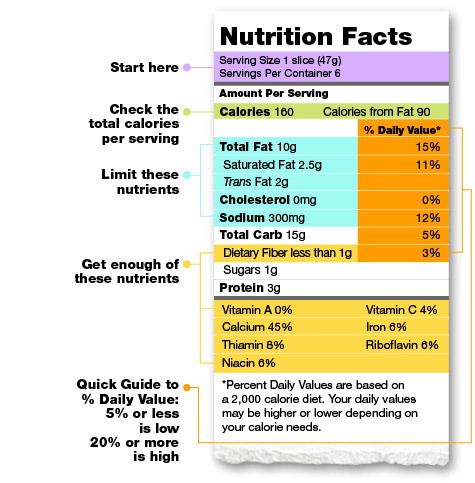This is possibly the silliest question ever..

tessi1993
Posts: 186 Member
hey guys !
im new to this.
i use to eat junk food after junk food.. (mainly because of my weed addiction, dont judge please)
i went on a cruise in december since then i smoke about 80% less than i use to.
i want to eat healthy!
i have cut out all junk, and stick to the good stuff. but i dont understand where the calories are on packets!
on packeted food etc
does it say it on all foods?! i have 1 serve of greek yogart infornt of me and it says
energy 541kj (129 cals) 6% 318kj (76 cals) which one is it?!
also with carbs, fat total, sugars etc, what should i watch out for, how much should i be having per serving?
sorry i must sound so stupid but help would be appreciated!
im new to this.
i use to eat junk food after junk food.. (mainly because of my weed addiction, dont judge please)
i went on a cruise in december since then i smoke about 80% less than i use to.
i want to eat healthy!
i have cut out all junk, and stick to the good stuff. but i dont understand where the calories are on packets!
on packeted food etc
does it say it on all foods?! i have 1 serve of greek yogart infornt of me and it says
energy 541kj (129 cals) 6% 318kj (76 cals) which one is it?!
also with carbs, fat total, sugars etc, what should i watch out for, how much should i be having per serving?
sorry i must sound so stupid but help would be appreciated!
0
Replies
-
Check what it says: does it say per serving or per 100 grams?
Then look on the packet if it tells you how many servings are in that packet.0 -
I dont even know where to begin. Well I do, at the very very beginning. I dont have time though, so hopefully one of my friends will see this.
A calorie is a unit of energy. Your body requires X amount of calories per day, depending on weight, height, and activity level, for fuel.
I am assuming that the number following 6% is the calories from fat...maybe? Hard to say without seeing the label.0 -
hey guys !
im new to this.
i use to eat junk food after junk food.. (mainly because of my weed addiction, dont judge please)
i went on a cruise in december since then i smoke about 80% less than i use to.
i want to eat healthy!
i have cut out all junk, and stick to the good stuff. but i dont understand where the calories are on packets!
on packeted food etc
does it say it on all foods?! i have 1 serve of greek yogart infornt of me and it says
energy 541kj (129 cals) 6% 318kj (76 cals) which one is it?!
also with carbs, fat total, sugars etc, what should i watch out for, how much should i be having per serving?
sorry i must sound so stupid but help would be appreciated!
You're going to find calories information on foods that have labels. For other foods - fresh fruits, vegetables, etc. - that come without labels, you'll have to increase your knowledge of nutrition. Once you start logging your food for a while, you get a sense of how many calories are in the foods you eat typically.
How many calories total are you taking in each day with MFP? From there you can figure out your calories per meal.0 -
it says 1250 calories per day.
the yogart was 129 grams per serve 79 per 100grams so is this a good choice?0 -
i ate mixed nut spread for breakfast, it says nothing on it about calories?!
whats this mean!!0 -
/Head tilt
It doesn't have a measure of calories/energy on the label at all?0 -
Look up the brand name and see if the nutritional information is on line.0
-
it has the energy? is that the same thing?0
-
/Head tilt
It doesn't have a measure of calories/energy on the label at all?
in Aus/nz most things don't have cals on them they go by Kjs...someone told me to divide whatever kjs per serve is on the packet by 4.2 and it'll be pretty close to the right answer eg 780kj = 185 cals ( don't quote me on that though) per serving0 -
still kinda unsure on what the question is sorry if that didn't help0
-
it has the energy? is that the same thing?
I'm fairly certain energy (shown with kj, if I'm not mistaken) converts to calories with some formula or another.0 -
thank u so much! yes im australian not american probably should have mensioned that
haha0 -
572kj divided by 4.2 = 136

that sounds right doesnt it?0 -
can you guys also check out my food for today?
should i cut out the bread? 0
0 -
572kj divided by 4.2 = 136

that sounds right doesnt it?
According to this conversion site it looks right. http://www.unitconversion.org/energy/kilojoules-to-calories-nutritional-conversion.html
You'll have to set your food diary to public if you want anyone to be able to see it.0 -
just put it on public please have alook
 0
0 -
usually it tells you how much the whole container is worth then it tells you how much 1 serving is worth0
-
i no??
whats the deal chloe :S0 -
yes, so it is the kj?
this site is perfect http://www.unitconversion.org/energy/kilojoules-to-calories-nutritional-conversion.html 0
http://www.unitconversion.org/energy/kilojoules-to-calories-nutritional-conversion.html 0 -
A typical serving of yogurt (6-8 ounces), if it is low fat or fat free will be around 100-180 calories. It depends on the brand. For instance, Yoplait's regular yogurts run about 170 cal., while their fat free kind is 100. However, I find theirs too sweet, and typically go for Greek yogurt, either Dannon's Oikos brand, or Chobani. Also, there is Total 0%, but I have never had that and can't tell you how it tastes. Oikos and Chobani run around 100(if you get plain or vanilla) to 160(if you get fruit flavours et cetera. I also just recently found this brand called Siggy's Skyre(I think that's how you spell it) yogurt, supposedly made Icelandic style. It's all-natural, and pretty tasty, similar to that of Greek yogurt, though maybe not as tart. The one I had (passion fruit-pomegranate) had 100 cal. In it. So....yeah after that ridiculously long rant about yogurt, I don't even know if you have these brands in Australia, or of this helps, but, I hope it was of some use.
Congrats on you new life style change with smoking and fitness! Keep it up, and God bless!0 -
for the comment abbove, thank you! and that does help. i use to eat "ski" thinking that was healthy, every one says greek yogurt is grose but i love it!
Chloe. are you saying you are right and the website is wrong?0 -
What in the hell is happening in this thread? Can someone translate and/or explain what the questions are?0
-
for the comment abbove, thank you! and that does help. i use to eat "ski" thinking that was healthy, every one says greek yogurt is grose but i love it!
Chloe. are you saying you are right and the website is wrong?
I don't know what's up with Chloe but the website is correct. Kj/4.2 = calories. Stick with that and be aware of your food choices an I'm sure you'll be fine.0 -
What in the hell is happening in this thread? Can someone translate and/or explain what the questions are?
I think the problem might be the difference in terminology....I have no clue where the swag comes in though.0 -
haha sorry guys!
the point of the thread is im from australia, and they have calories as KJ so there not listed on foods and i was so confused, which now im not! haha.
if you could check my food for today and give me some tips that would be awesome!
and i have no idea whats going on with chloe and her "swag".....0 -
haha sorry guys!
the point of the thread is im from australia, and they have calories as KJ so there not listed on foods and i was so confused, which now im not! haha.
if you could check my food for today and give me some tips that would be awesome!
and i have no idea whats going on with chloe and her "swag".....
hmm, they don't put in calories in Kangaroo land? Mind you, it "might" say kilo calories (The correct term I believe). I know in most Asian countries they do put in both. You can always google it (I googled "how many calories = joules" and got the result of 1 joule = 0.239005736 calories
As for the swag... I think you know the answer. Anyone using the word swag while using a fake pic from the interwebs has lots of issues
ETA: NOT the silliest question. I've seen many that would qualify. Your question is not even in the top 1,0000 -
Think someones smoking pot and i'm not talking about the OP at he made sense.0
-
haha sorry guys!
the point of the thread is im from australia, and they have calories as KJ so there not listed on foods and i was so confused, which now im not! haha.
if you could check my food for today and give me some tips that would be awesome!
and i have no idea whats going on with chloe and her "swag".....
hmm, they don't put in calories in Kangaroo land? Mind you, it "might" say kilo calories (The correct term I believe). I know in most Asian countries they do put in both. You can always google it (I googled "how many calories = joules" and got the result of 1 joule = 0.239005736 calories
As for the swag... I think you know the answer. Anyone using the word swag while using a fake pic from the interwebs has lots of issues
ETA: NOT the silliest question. I've seen many that would qualify. Your question is not even in the top 1,000
thank you!
no they dont it says (KJs) thats why i was so confused! thank you0 -
Think someones smoking pot and i'm not talking about the OP at he made sense.
the OP? say whhhat?
is this meant to be to me...0 -

Start here. Note the size of a single serving and how many servings are in the package.
Check total calories per serving. Look at the serving size and how many servings you’re really consuming. If you double the servings you eat, you double the calories and nutrients, including the Percent Daily Value (% DV).
Limit these nutrients. Remember, you need to limit your total fat to no more than 56–78 grams a day — including no more than 16 grams of saturated fat, less than two grams of trans fat, and less than 300 mg cholesterol (for a 2,000 calorie diet).
Get enough of these nutrients. Make sure you get 100 percent of the fiber, vitamins and other nutrients you need every day.
Quick guide to % DV. The % DV section tells you the percent of each nutrient in a single serving, in terms of the daily recommended amount. As a guide, if you want to consume less of a nutrient (such as saturated fat, cholesterol or sodium), choose foods with a lower % DV — 5 percent or less is low. If you want to consume more of a nutrient (such as fiber), seek foods with a higher % DV — 20 percent or more is high.
Here are more tips for getting as much health information as possible from the Nutrition Facts label:
Remember that the information shown in these panels is based on 2,000 calories a day. You may need to consume less or more than 2,000 calories depending upon your age, gender, activity level, and whether you’re trying to lose, gain or maintain your weight. Find out your personal daily limits on My Fats Translator.
In general, as you think about the amount of calories in a food per serving, remember that for a 2,000-calorie diet:
40 calories per serving is considered low;
100 calories per serving is considered moderate; and
400 calories or more per serving is considered high.
There is no % DV shown for trans fat on the panel because the U.S. Food and Drug Administration (FDA) does not have enough scientific information to set this value. We recommend eating less than 20 calories or (less than two grams of trans fat) a day – that’s less than 1 percent of your total daily calories (for a 2,000-calorie-a-day diet).
When the Nutrition Facts panel says the food contains “0 g” of trans fat, it means the food contains less than 0.5 grams of trans fat per serving.
When the Nutrition Facts label says a food contains “0 g” of trans fat, but includes “partially hydrogenated oil” in the ingredient list, it means the food contains trans fat, but less than 0.5 grams of trans fat per serving. So, if you eat more than one serving, you could quickly reach your daily limit of trans fat.
In addition to the Nutrition Facts label, a lot of foods today also come with nutrient content claims provided by the manufacturer. These claims are typically featured in ads for the foods or in the promotional copy on the food packages themselves. They are strictly defined by the FDA. The chart below provides some of the most commonly used nutrient content claims, along with a detailed description of what the claim means.0
This discussion has been closed.
Categories
- All Categories
- 1.4M Health, Wellness and Goals
- 398.1K Introduce Yourself
- 44.7K Getting Started
- 261K Health and Weight Loss
- 176.4K Food and Nutrition
- 47.7K Recipes
- 233K Fitness and Exercise
- 462 Sleep, Mindfulness and Overall Wellness
- 6.5K Goal: Maintaining Weight
- 8.7K Goal: Gaining Weight and Body Building
- 153.5K Motivation and Support
- 8.4K Challenges
- 1.4K Debate Club
- 96.5K Chit-Chat
- 2.6K Fun and Games
- 4.8K MyFitnessPal Information
- 12 News and Announcements
- 21 MyFitnessPal Academy
- 1.5K Feature Suggestions and Ideas
- 3.2K MyFitnessPal Tech Support Questions









